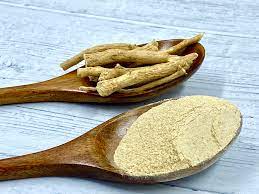What is Ashwagandha and what are its benefits?
The plant Ashwagandha has been used in Ayurveda for thousands of years to treat a variety of health issues. It can be found growing wild all over India, but most often grows as an ornamental tree or shrub in parks and gardens. Learn more about this incredible herb…
Ashwagandha (Withania somnifera), also known as the winter cherry, Indian gourd or nightshade with white flowers, is native to South Asia where it thrives naturally across mountain regions from Afghanistan to Nepal. The medicinal properties of ashwagandha have long been recognized by practitioners of Ayurveda medicine who use its leaves, roots, bark and fruits medicinally to help maintain overall good health, vitality and well-being. Its traditional uses include treating digestive disorders such as flatulence, constipation, diarrhoea and dysentery; bronchitis, coughs, colds, fever, flu, liver disease, jaundice and kidney stones; diabetes mellitus type 2; hypertension; skin diseases including eczema and psoriasis; hair loss; depression and anxiety; fatigue; insomnia; osteoporosis; rheumatism; leprosy; tuberculosis; and eye infections.
In recent times, however, research on ashwagandha has expanded beyond these traditional applications to explore how the root may play a role in preventing cancer, heart disease and stroke, improving memory function, enhancing sexual performance, promoting healthy aging and slowing down the effects of Alzheimer's disease. In addition, studies suggest that Ashwaganda could be helpful in relieving symptoms associated with post traumatic stress disorder (PTSD) including nightmares, panic attacks, irritability, anger management, hypervigilance and emotional numbness.
Today, you can find ashwagandha grown everywhere from tropical rainforests to arid desert areas and even along riverbanks. You'll see it growing wild among trees and bushes in fields and forests, or planted like other garden plants in public spaces and private yards alike. There are many different varieties of ashwagandha, each one suited to local conditions and needs. Some types grow only during certain seasons while others bloom year round. One thing they share in common though is their ability to thrive under harsh environmental conditions when other crops wither and die off. This adaptable nature makes ashwagandha one of the world's hardiest herbs and natural remedies.
As we mentioned earlier, ashwagandha has traditionally been cultivated throughout the vast expanse of South Asia for centuries. Today, this region encompasses countries ranging from Pakistan to Bangladesh, Bhutan to Sri Lanka, Nepal to Indonesia and Malaysia. These nations rely heavily upon indigenous knowledge passed down through generations of herbal healers known as ayurvedic physicians. Traditionally, ashwaganda was prepared into tisanes, decoctions, powders, ointments, poultices, oils, salves, creams and lotions which were then administered orally, applied topically or taken internally.
Ashwagandha Benefits
One reason why ashwagandha stands out among other herbs is because it has so many beneficial properties. Let's take a closer look at some of them.
Ayurvedic Medicine - Because ashwagandha contains anti-inflammatory compounds called shogaols, research suggests that the herb may reduce pain and inflammation related to arthritis, menstrual cramps and sprains. Other studies show that ashwagandha improves cardiovascular functions, reduces blood pressure, lowers cholesterol levels and provides protection against high blood pressure-related organ damage. When combined with other active constituents within the herb, researchers speculate that Ashwaganda helps protect cells and tissues from free radical damage caused by UV radiation and oxidation reactions. Free radicals lead to cell damage and contribute to ageing processes. They're linked to multiple forms of cancers and inflammatory disease states, too. By helping your body fight free radicals, ashwagandha may slow premature ageing and offer additional antioxidant support.
Anti Ageing
Studies conducted by scientists at Harvard Medical School indicate that ashwagandha increases longevity and protects against age-associated degenerative changes. Researchers believe this effect results from improved immunity and reduced oxidative stress.
Depression & Anxiety Relief
Clinical trials show that ashwagandha significantly enhances mood and mental alertness without causing side effects like drowsiness or dizziness. As a result, patients taking the herb reported feeling less anxious, depressed and fatigued than those not using the supplement. Another study showed that people suffering from mild cases of generalised anxiety experienced relief after just two weeks of treatment. A separate series of experiments demonstrated significant improvements in both cognitive flexibility and attention span following six months' worth of supplementation. Patients taking Ashwagandha also exhibited lower rates of depression compared with placebo groups. Researchers attribute these positive outcomes to enhanced brain chemistry resulting from increased production of neurotransmitters dopamine, norepinephrine, serotonin and gamma amino butyric acid (GABA). GABA plays a critical part in regulating our nervous system and reducing excitability in the brain. Increased amounts of this compound in turn keep us calm and focused rather than tense and distracted. Ashwagandha may work similarly to benzodiazepines and prescription tranquilisers such as Valium and Xanax. However, unlike these drugs, ashwagandha does not cause dependency or addiction problems once discontinued. Instead, users report feeling refreshed and relaxed.
Sleep Aid/Relief
Many people struggling with sleep deprivation start looking for ways to improve their energy and restorative power. That includes consuming substances like caffeine and nicotine which stimulate wakefulness and alertness. While these stimulants certainly aren't ideal for everyone, there's no denying that they produce short term results. But over time, chronic consumption leads to tolerance, dependence and withdrawal headaches. If you experience this, consider giving ashwagandha a try instead. According to several clinical studies, regular doses of the herb promote quality sleep and may help with your circadian rhythm without producing any negative side effects whatsoever. Users report better focus and concentration afterward, as if waking up fresh and rested every morning.
Boost Immunity
Recent evidence shows that ashwagandha stimulates the immune system and boosts its defence mechanisms against infection. Several animal studies demonstrate that supplements containing the herb increase survival rates following exposure to viral pathogens including herpes simplex 1 and hepatitis B. Research performed at Tufts University indicated that mice treated with extracts rich in antioxidants showed higher resistance to fungal and bacterial infections like E. coli urinary tract infections. Scientists suspect that ashwagandha's immunostimulant activity comes from chemicals called Withanolides which are produced by the herb itself. Like aspirin, ashwagandha inhibits platelets responsible for clotting blood until needed. Unlike aspirin, however, ashwagandha doesn't carry the risk of bleeding or bruising. So instead, it promotes faster recovery times and decreases swelling.
Stress Management
People dealing with stressful situations know first hand how difficult it can be to manage tension effectively. Unfortunately, sometimes coping methods don't always provide lasting solutions. That's especially true if they require ongoing effort. Taking ashwagandha regularly helps relax muscles and nerves while increasing energy levels at the same time. What's more, the herb works best when consumed before engaging in strenuous activities. Doing so prepares the mind and body for physical challenges ahead. Afterward, ashwagandha supports digestion and prevents muscle spasms. Chronic intake produces noticeable physiological responses within hours. At low dosages, ashwagandha causes minimal sedation and daytime drowsiness. Those with ADHD or ADD benefit greatly from taking the herb since it gives them greater control and focus. Overall, ashwagandha offers fast acting yet powerful solutions for managing everyday stresses.
How To Use Ashwagandha For PTSD, Anxiety, Depression Treatment
When it comes to fighting anxiety and depression, nothing beats medication. Medication tends to come with numerous limitations, however, particularly in terms of cost, potential side effects and sometimes, effectiveness. Fortunately, there are alternatives available to address these shortcomings. Among them, ashwagandha holds great promise due to its versatile range of therapeutic strengths and proven track record of safety. Here's how you can incorporate it into your daily routine for optimal healing results.
Treatments vary depending upon severity of condition being targeted. Start small by adding 10 drops per day to water and drinking immediately prior to meals. Do this consistently over time for three consecutive days followed by a week's break. Then repeat the process again for another set of seven days. Continue doing this over the course of four weeks. Once symptoms subside, gradually decrease dosage amounts based on individual response. Over time, continue incorporating ashwagandha into your lifestyle. Consume it as much as possible, whether in tea form, capsules, tablets or pills. Drink plenty of fluids between servings to avoid dehydration and make full use of its benefits.
For moderate to severe cases, consult a licensed medical professional familiar with alternative therapies.


